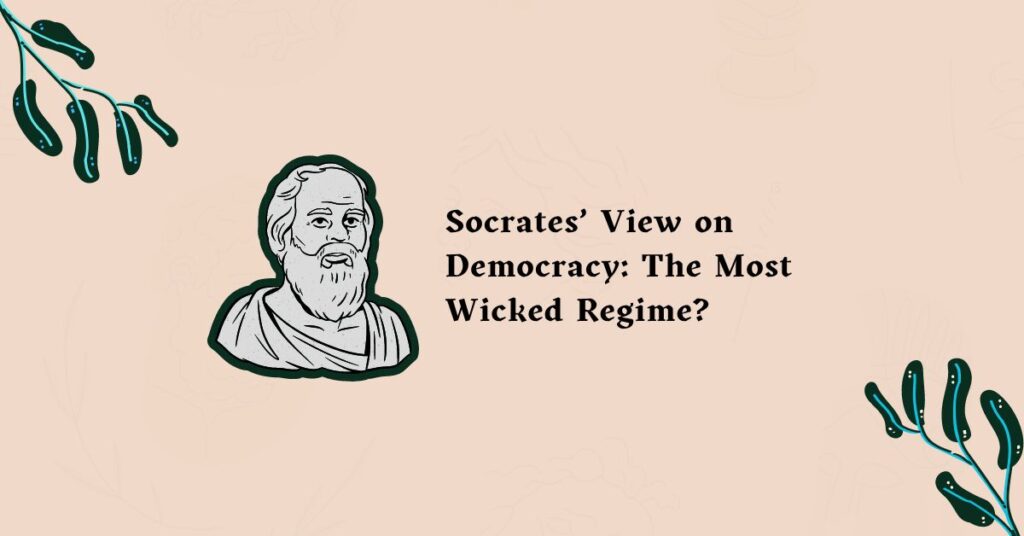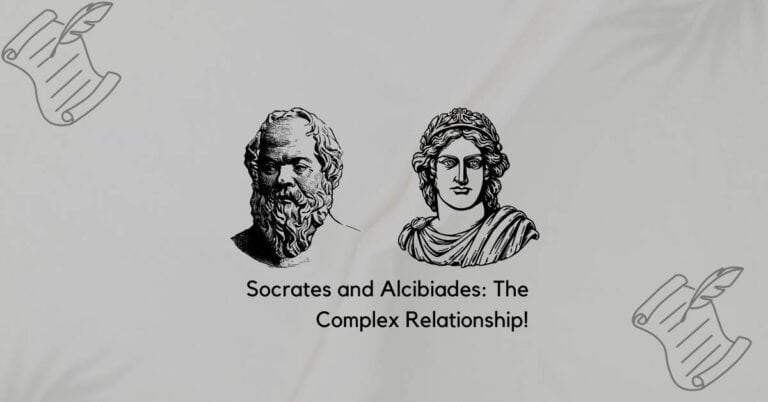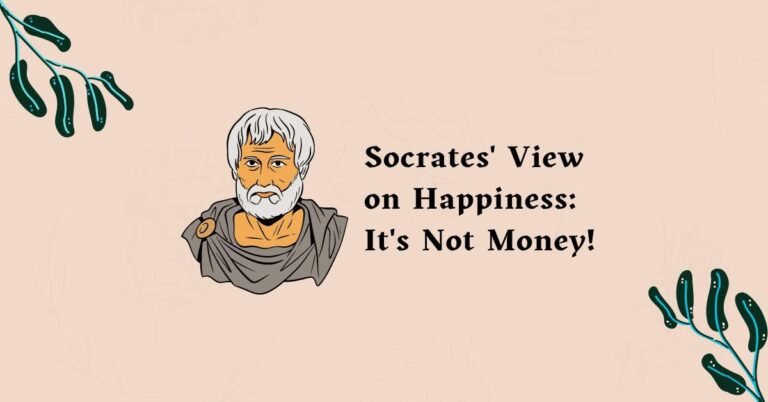Socrates’ View on Democracy: Why He Hated It?
First of all, before discussing Socrates’ view on Democracy, you need to know that Democracy during Socrates’ era had a different meaning than now. At that time, Socrates spoke about direct Democracy, which means the rulers are the demos (people). A different form of Democracy was present at that time, which we will cover in the later part of this article.
But today, we live in an era of representative Democracy or democratic republics. And usually, we refer to representative Democracy or Parliamentary Democracy with it. So, both are quite different.
So, now that you know the terminology problem, let’s dive into the conversation.
1. Why Socrates’ view on Democracy matters?
You might wonder why Socrates’ views on Democracy are essential. It’s because he makes us think hard about how governments work. He helps us see that Democracy isn’t perfect. It has some flaws. Socrates makes us question how people can be easily influenced by leaders who don’t have their best interests at heart. He lived when Democracy was just starting, so he saw its problems up close.
What he said about Democracy still makes sense today because we can see similar issues in modern democracies. Socrates’ views on Democracy teach us to look closely at how our governments function and to understand their strengths and weaknesses.
Socrates’ Perspectives on Democracy:
Socrates’ thoughts on Democracy were straightforward. You would let only skilled sailors sail a ship, a qualified doctor treat you, and even a specialist at shoe stitching stitch your shoes. Then, why wouldn’t you let only the experienced and knowledgeable people run the state?
If people who lack proper knowledge are put into the work of making sensitive decisions for a country, the outcome would be catastrophic. And no matter where you are from, you probably have already experienced something like this.
According to Socrates only the people who think and have the right knowledge about political issues and society should be given the power to have a say in the legislation.
According to Socrates, society will fall and won’t work correctly if philosophers don’t become the rulers of the state or if the rulers don’t become the philosophers.
He believed the ideal ruler of a state was a philosopher king. Because they could lead the country with his deep knowledge and studies during his lifetime. However, Socrates never abolished Democracy in favor of autocracy.
Socrates’ Statements on Democracy in the Apology:
In The Apology by Plato, Socrates puts his view on Athenian Democracy by giving a couple of analogies. These are given below:
Ship of Fools Analogy: Socrates compares society to a ship navigated by unskilled sailors who believe they’re entitled to steer. They overthrow the captain, appoint an unqualified leader, and disregard the importance of skill in leadership.
Doctor Analogy: Socrates suggests that just as a sick person seeks out a qualified doctor for treatment, citizens should choose only competent rulers. He criticizes the current rulers as akin to mutinous sailors and praises those with true expertise. Moreover, Socrates admired the non-democratic governance of Sparta, suggesting a preference for their system over Athenian Democracy.
Socrates’ Critique of Democracy:
You already can understand that Socrates’ views on Democracy were skeptical, like his views on religion and others. It was like a toxic relationship between Socrates and Democracy. He believed governance should be left to specialists only. His point was that Democracy will only ever work if coupled with Education.
He argued that giving every citizen, regardless of proper Education or knowledge, the right to vote could lead to manipulation by charismatic leaders. Therefore, Socrates questioned the suitability of Democracy, seeing it as a system vulnerable to manipulation and lacking in effective governance.
Now that you know Socrates’ thoughts about Democracy, let’s see what his student Plato has to say about it. Moreover, we will cover Aristotle’s views on it, as he is Plato’s best student.
2. Plato and Aristotle’s Views on Democracy:
Plato, through the voice of Socrates in “The Republic,” critiques Democracy, ranking it as the fourth best or second worst of five regimes. He views Democracy as a societal and psychological way of life. Here, individuals prioritize fulfilling their desires over-exercising reason and self-control. Additionally, Plato documents Socrates’s trial, verdict, and execution in his dialogues.
Aristotle also criticizes Democracy, categorizing it as one of three “perverted” or flawed regimes in which rulers govern in their self-interest. In Democracy, according to Aristotle, the interests of the poor prevail, potentially leading to rule by the majority without regard for justice or the common good. Moreover, for Aristotle, Democracy is by far the worst regime.
The Best Regime According to Plato and Aristotle:
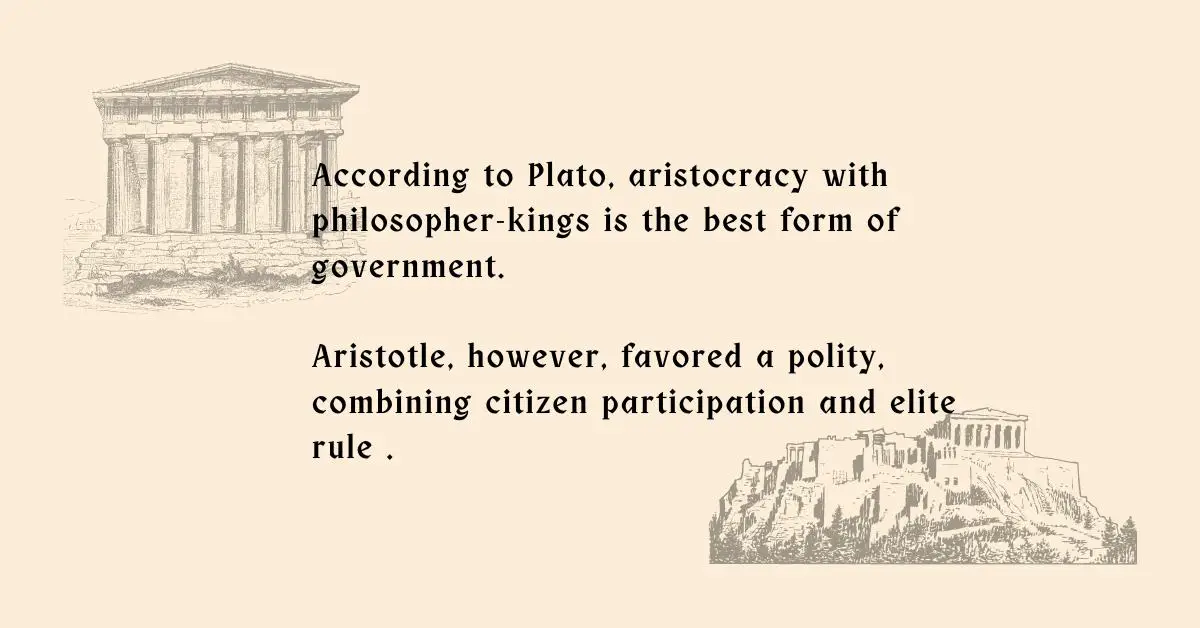
Plato:
According to Plato, the best regime is a utopian society governed by philosopher-kings. In The Republic, Plato outlines a vision of an ideal state led by rulers who possess a deep understanding of truth, justice, and ideal forms.
These philosopher-kings govern with wisdom, reason, and a commitment to the common good, ensuring a harmonious society.
Aristotle:
On the other hand, Aristotle considers the best regime to be a mixed or balanced form of government called “polity” or “constitutional government.” In his work “Politics,” Aristotle advocates for a regime where power is shared among different social classes, with the middle class playing a significant role.
This mixed regime combines elements of Democracy and oligarchy, with political power distributed based on merit and virtue. Aristotle sees this balanced form of government as the most stable and just because it prevents the extremes of tyranny and mob rule.
In summary, while both Plato and Aristotle believe in the importance of virtuous leadership, they differ in their specific proposals for the best regime. Plato favors rule by philosopher-kings, while Aristotle advocates for a mixed regime that balances the interests of different social classes.
3. Founder of the Democratic System:
So, now that you know the dark side of Democracy and its flaws, the question might arise: where did it all begin, and by whom?
The term “father of democracy” is often attributed to Cleisthenes, an ancient Athenian statesman who laid the foundations of Democracy in Athens around 508 BCE. Cleisthenes introduced various political reforms that expanded citizen participation in government and reduced the power of aristocratic families.
His reforms included creating the Council of Five Hundred, a representative body chosen by lot from the citizenry, and establishing the principle of isonomia, or equal rights for all citizens.
While Cleisthenes played a significant role in the development of Athenian Democracy, it’s essential to recognize that the concept of Democracy evolved through the contributions of many individuals and political thinkers in ancient Greece.
Therefore, while Cleisthenes is often referred to as the “father of democracy,” it’s more accurate to view him as one of the key figures in the early development of democratic principles in Athens.
Athenian Democracy in Socrates’ Time: What Was It Really Like?
Yes, during Socrates’ era, Democracy was present in Athens. But you need to know that the democratic system of Athens was quite different from today. Athenian Democracy involved eligible citizens directly participating in decision-making, such as passing laws, electing officials, and conducting trials.
In the democratic assembly, male citizens over 18 could propose and vote on laws. This direct Democracy gave citizens a direct role in governing the city-state.
However, Athenian Democracy had limitations. Only free male citizens could participate, excluding women, enslaved people, and foreigners. Additionally, decisions in the assembly could be influenced by skilled speakers and leaders, impacting public opinion.
In summary, Athenian Democracy during Socrates’ time allowed citizen involvement in governance despite its restrictions and challenges.
Father of Modern Democracy:
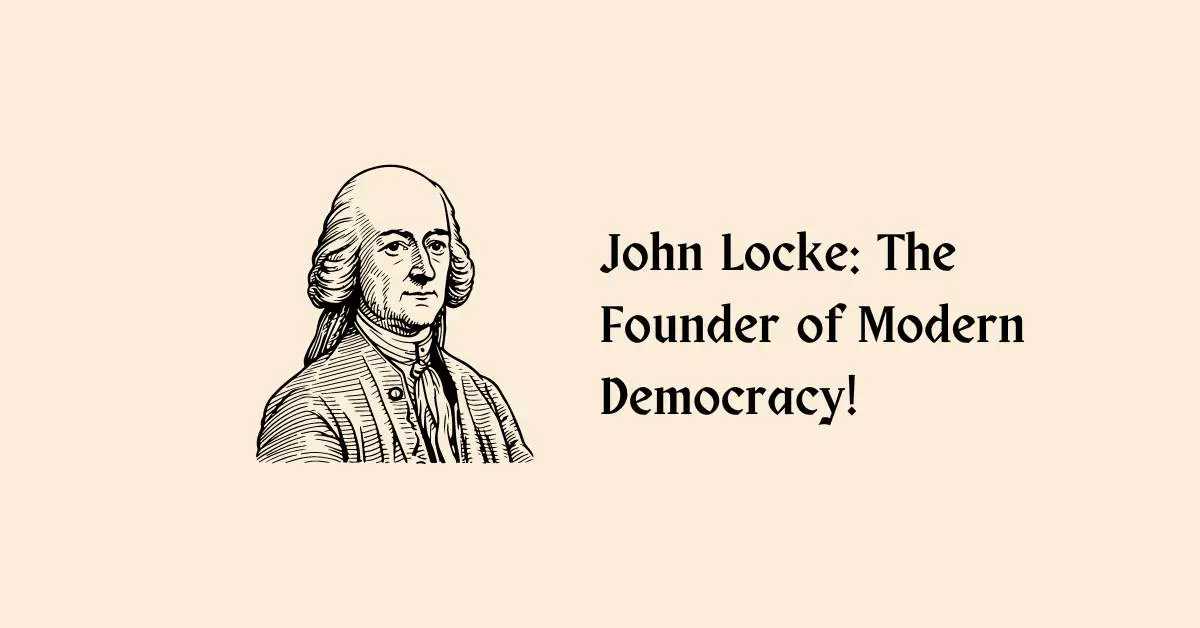
John Locke is widely considered the father of modern Democracy. We came to know about the contemporary form of Democracy, which is Parliamentary Democracy, because of him through his renowned book called “Two Treatises of Government.”
John Locke was an English philosopher and physician who was born on August 29, 1632, in Wrington, Somerset, England. He is widely regarded as one of the most influential Enlightenment thinkers and is best known for his contributions to political philosophy and epistemology. Locke’s works, including “Two Treatises of Government” and “An Essay Concerning Human Understanding,” have profoundly impacted the development of modern liberalism, Democracy, and empiricism.
4. Plato’s Critique of Democracy:
Plato, a student of Socrates, expressed skepticism about Democracy in his writings, particularly in “The Republic.” While Plato acknowledged Democracy’s potential to promote equality and freedom, he also criticized its susceptibility to manipulation by demagogues and its tendency to prioritize popular opinion over truth and justice.
Plato advocated for a form of government led by philosopher-kings, individuals who possess wisdom and virtue and govern based on principles of justice and the common good. He viewed Democracy as inherently flawed and argued for a more meritocratic and hierarchical system of governance.
Qualities of a Philosopher King According to Plato:
The journey to becoming a Philosopher-king is arduous and often criticized due to its extensive and demanding learning process. Additionally, it requires significant sacrifices, including separating from one’s family and relinquishing personal wealth. Now, let’s learn a little about the education system someone had to undergo to become an ideal ruler, according to him.
Plato’s educational system has two main categories: Primary Education and Higher Education. Primary Education is further divided into two stages:
- First Stage (6-18 years): During this period, individuals learn about religion, morality, good behavior, poetry, and basic mathematics.
- Second Stage (18-20 years): In this Stage, primary Education focuses on physical fitness, military training, and cultivating a hard work mentality. After undergoing examination, qualified individuals proceed to Higher Education.
Higher Education is divided into three stages:
- First Stage (20-30 years): Students delve into Geometry, advanced mathematics, Astrology, and Logic.
- Second Stage (30-35 years): Students study Higher philosophy and metaphysics, delving into more profound philosophical concepts.
- Third Stage (35-50 years): This Stage emphasizes practical Education, where students actively participate in governance and military affairs. They aim to qualify as rulers of the ideal state through rigorous training and extensive knowledge.
Yes, as you might have thought, becoming a philosopher king is lengthy and resource-intensive. That’s why his idea of a philosopher king in an ideal state is tremendously criticized.
But at that time, it was necessary for Athens’ development, although this process of becoming an ideal ruler is not ideal for the modern era, where different approaches to leadership and Education prevail.
Conclusion:
In conclusion, Socrates’ critique of Athenian democracy provides profound insights into the challenges and complexities of governance and political philosophy. His skepticism towards popular rule and advocacy for philosopher-kings underscore his concerns about the effectiveness and morality of democratic systems. Socrates questioned whether the general populace, lacking philosophical wisdom, could make informed and just decisions, highlighting potential vulnerabilities within democratic governance.
Examining Socrates’ perspective reveals important considerations about the role of wisdom, virtue, and education in shaping effective leadership and governance. His ideas encourage a deeper understanding of democratic systems and provoke reflection on how philosophical principles can inform and improve political structures.
Socrates’ legacy extends beyond his critique of democracy, inviting us to critically evaluate our own political systems and aspire to a more informed and ethical approach to leadership. His philosophical contributions, akin to those of other great thinkers like Buddha, offer valuable reflections on justice, happiness, and the nature of a well-lived life. By engaging with Socratic thought, we gain a richer perspective on the intersection of philosophy and practical governance.

